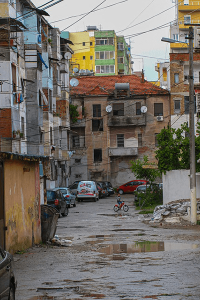Our assessments:

Local quality of life
Improving local quality of life is key because it directly affects people's well-being, health and satisfaction in their daily lives.
A special feature of the evaluation is that we have included the results of a public opinion survey.

Sustainable transport development
Promoting sustainable transport is important because it reduces pollution, reduces congestion and contributes to a more liveable urban environment in the long term.
The evaluation looked at how the
developing sustainable urban transport, improving suburban rail accessibility; developing the regional economic environment to promote employment; the transition to a low-carbon economy with a focus on urban areas; sustainable urban development in county towns; and promoting energy efficiency, smart energy use and the use of renewable energy.

Local economic development
Local economic development aims not only to support economic growth, but also to achieve qualitative changes such as increasing employment, solving social problems and improving the well-being, standard of living or quality of life of local people.
The presentation on this can be found here
Horizontal principles
Addressing the horizontal principles is important because these principles - such as social equity, sustainability and equal opportunities - ensure that different development programmes and policies have a wider, long-term positive impact on society and the environment.
The evaluation looked at how the horizontal principles are applied at the level of project implementation, whether good practices can be identified and how well the institutional arrangements put in place help project promoters to put the principles into practice.

Integrated territorial implementation
Integrated territorial implementation is a development approach that seeks to achieve comprehensive, coordinated development in different areas (e.g. economy, transport, environment, society) in a given region or municipality. It aims to provide complex solutions that respond to local needs, taking into account local conditions and resources. Such an approach helps to ensure that development resources are used efficiently and to improve territorial cooperation, thereby contributing to sustainable and balanced development.
The evaluation looked at the lessons learned from the regulation and application of the territorial selection system (TSR) and its institutional system introduced in the 2014-2020 programming cycle for the TOP and the VEKOP.

Climate adaptation
As climate change is already being felt in the form of extreme weather events, sea-level rise, heat waves and droughts, it is essential to increase the resilience of people, the economy and infrastructure.
The evaluation had two objectives. Firstly, to assess developments that directly address climate adaptation and, secondly, to examine climate change adaptation and the climate risk analyses that were carried out for this purpose, which covered all OP priorities allowing for infrastructure investments as well as the Rural Development Programme (RDP) as a horizontal requirement.

Communication
Information on EU funding is important to ensure that people and businesses are aware of the opportunities and the results of the funding.
The aim of the evaluation is to identify the results of the communication related to the implementation of the operational programmes of the 2014-2020 programming period, to identify the relevant experiences, to help implement and fine-tune the communication of the operational programmes and to plan the communication of the 2021-2027 programming period.

Social settlement rehabilitation
Social settlement rehabilitation programmes are essential for improving living conditions in deprived areas, promoting social inclusion and long-term sustainable development. Such rehabilitation can reduce social inequalities, prevent segregation and ensure a more liveable and inclusive environment for all.
The evaluation assessed the effectiveness of the TOP, VEKOP and EFOP developments with a housing component. The overall objective is to explore how the developments influence social inclusion processes and their leverage in the context of local and national level measures to halt and reverse territorial decline.

TEN-T
The importance of the TEN-T (Trans-European Transport Network) lies in the fact that it facilitates the free movement of goods and people between the Member States of the European Union by unifying and developing transport infrastructure, contributing to economic growth and competitiveness. The network will create an efficient, sustainable and safe transport system by linking road, rail, water and air transport routes.
The evaluation examined whether the road and rail improvements implemented under the Integrated Transport Operational Programme (ITOP) in the 2014-2020 cycle contributed to increasing the number and quality of the trans-European transport network (TEN-T) elements running in Hungary and to improving rail safety..

Rural Development Programme
Agricultural subsidies are crucial to farmers' livelihoods, promote sustainable production and contribute to food security.
The task of the project was to analyse the procedures of the New Hungary Rural Development Programme and the New Széchenyi Plan, and to develop simplification proposals. The evaluation aimed at simplifying the procedures of the New Hungarian Rural Development Programme through the proposals made through the analysis, while highlighting the potential for harmonisation of the two support schemes.
